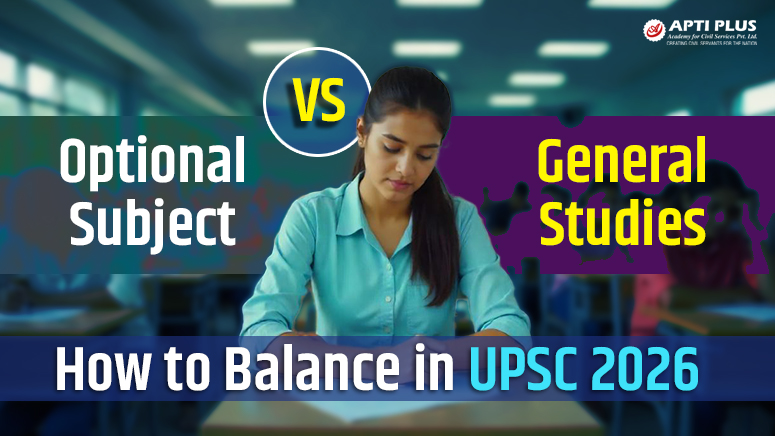




The UPSC Civil Services Examination (CSE) evaluates not only knowledge but also strategic planning, endurance, and focus. Many aspiring students ask themselves, "How can I balance my preparation for General Studies (GS) with my chosen optional subject?" as they begin this difficult journey. You can't succeed without either, but many candidates have trouble balancing the two.
Some students, driven by the chance to get high scores on this important test, get so interested in their optional subject that they forget to study GS. Some students spend all of their time on GS instead of their optional because they think it will be more important.
General Studies (GS) in the UPSC Mains comprises four papers of 250 marks each, totaling 1000 marks. It covers a broad range of subjects like History, Geography, Polity, Economy, Environment, Science, and Ethics. Since every aspirant writes the same GS papers, it acts as a common ground to assess general awareness and analytical ability. GS preparation is extensive but more structured, and its performance is crucial to clear the mains cutoff.
Optional Subject, on the other hand, consists of two papers of 250 marks each, adding up to 500 marks. Candidates choose one subject from a list of options like Sociology, Anthropology, PSIR, or Literature. This section demands in-depth understanding and specialized preparation. Unlike GS, the optional subject can be a high-scoring area and often becomes the deciding factor in achieving a top rank, especially when chosen wisely based on interest and background.
The UPSC exam has General Studies papers that cover a lot of different subjects, such as history, geography, politics, the economy, the environment, science, and current events. Having a solid understanding of GS is crucial because the GS papers make up a significant chunk of the Prelims and Mains exams.
The Mains exam's outcome might be drastically affected by the optional subject paper. Due to its specialized nature, it enables candidates to achieve higher marks. It is of the utmost importance to select an optional subject that suits your interests and capabilities.
Aspirants often fail because they don't set goals that are clear and can be measured. If goals aren't made clear, both GS and optional preparation can feel like they will never end.
This is how you can break down your plan:
Time management is, without a doubt, one of the hardest things for anyone who wants to get into the UPSC. You need to learn how to manage your time well because both GS and the optional subject have a lot of material to cover. If you manage your time well, GS and the optional will both get the attention they need.
One good method is the Pomodoro Technique. Focus on one thing for 25 minutes, then take a 5-minute break. This can keep you busy and keep you from getting burned out.
The best IAS coaching center in Kolkata offers integrated study plans that help people who want to take the UPSC exam do well on both parts of the test.
Revision on a regular basis is important for remembering things. Set aside time every week to go over both your required and optional subjects again. To help you remember what you've learned, use tools like flashcards, quizzes, and summarizing your notes.
It is very important to practice writing answers for both GS and optional papers. Set aside regular time to write essays and answers. Pay attention to how you organize your answers, how clear your arguments are, and how relevant your examples are.
For both GS and Optional, you need to write answers on a regular basis. The best Online Test Series for UPSC helps you test your knowledge, get better at managing your time, and feel more confident. You can also sign up for the best Test Series for UPSC 2026 to get extra help before the test.
Pick the right books to study for GS and the subject you chose as an option. The main things you should use to study are NCERT books, standard reference books, and reliable websites. For optional subjects, look at the books and other materials that experts and toppers say are good.
You don't have to treat your preparation for GS and the optional as two separate things. There is a lot of room for overlap, which can make your study plan easier.
For example, if you are studying for GS Paper II (Polity, International Relations), you will also be studying for Political Science & International Relations (Optional). In the same way, Geography as an optional subject has a strong connection to GS Paper I (Geography).
Overlap areas for GS and Optional
These overlap let you go over and understand ideas from both the GS and optional papers without having to do the same work twice.
Aspirants should also think about other aspects, like the best UPSC coaching center for 2026 and other study materials. You will get the best preparation if you spend money on good coaching and test series.
To balance UPSC Optional with GS, you need a plan, advice from experts, and lots of practice. You will stay on track if you join APTI PLUS, the best UPSC Coaching Center in Kolkata, and use the test series and supervised coaching. Be smart about the choice you make, stay committed, and reach your IAS goal!
To learn more about APTI PLUS, the best IAS coaching center in Kolkata contact us now!
© 2026 iasgyan. All right reserved